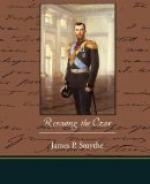“Thank you.”
I went to Pashinsky, whose teasing was becoming hideous and rough. He said to the Heir that they had decided to shoot the whole family. Tears were on the child’s face but he kept on bravely; he could not go away—Pashinsky was at the gate.
I wished: “Just a day or two,—and I will be able to do something. Oh, God! Send something to stop it right now.”
I guess that my prayer was heard.
The tutor’s face,—one of those broad Russian faces,—gradually grew purple and then grey. Slowly, and hypnotising Pashinsky, he approached the scamp, took him by the collar and pulled him towards the fence. Then, losing his breath, Derevenko said, “Leave the boy alone, you scoundrel! You,—you call yourself a Russian sailor? You? Have this....” and the slap on Pashinsky’s face sounded to me like Chopin’s First Nocturne. What divine music!
I expected a clash. But no! The rifle fell out of Pashinsky’s hands and, silent and tamed, with half-closed eyes, he was waiting for another smash. Then Derevenko saw me and thought I was going to shoot him, but I made no such move. I slipped away and went innocently towards the big gate. So, when Pashinsky came to me—he was sure I had seen nothing, and when I asked how the teasing was going on, he answered:
“Oh, I let this trash go. It annoys me.”
The left side of his face was inflamed and tears were frozen on his eyes. It was a good one, by God!
After this incident I turned to the quarters “for a drink of water” and wrote a little note that “nothing bad could happen to the Princesses when they were alone” and that, “I shall exert all in my power to prevent any disagreeable happenings.” I wrote that I knew some people were working to save them. My letter, I thought, would brace them up and would give them an idea that there was, amongst these beasts—one, that would not be an enemy. In case of a struggle this idea would keep them from losing hope and their power of resistance. Then I added that I could be found in the hotel, and that Dr. Botkin knew me.
Contemplating my scratchings, I went over to the window; somebody was patiently waiting and looking around, for the voice said:
“I am so glad Derevenko slapped this awful man.”
“I am too, your Highness. Now—there is a letter. I’ll put it on the bayonette and stay still; you take it.”
Pashinsky passed near me talking with another Red. He felt badly I am sure,—he did not look at me.
I rolled the piece of paper, stuck it on the edge of the sharp bayonette and putting the rifle on my shoulder, directed it towards the window. I felt when it was taken. Then I joined my fellow jailers.
48
Today I saw a man who resembled strikingly the Tumen Russian of the profane language. And it reminded me very much of the Ls., of the English officer, of the fellow with dark eyeglasses—and of Lucie. I felt abandoned again. So I went to the Church, but then turned back: I cannot go in, for it might spoil my reputation of a Red. However, I stood for a bit near the doors and listened to the singers, and then decided to go to the Catholic church, for only Russian Reds must not pray; Polish Reds happen to have this privilege.




